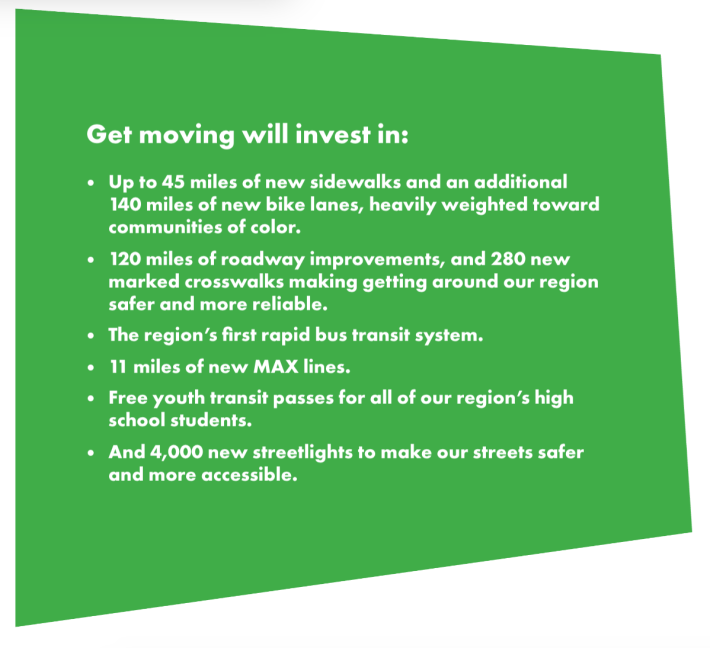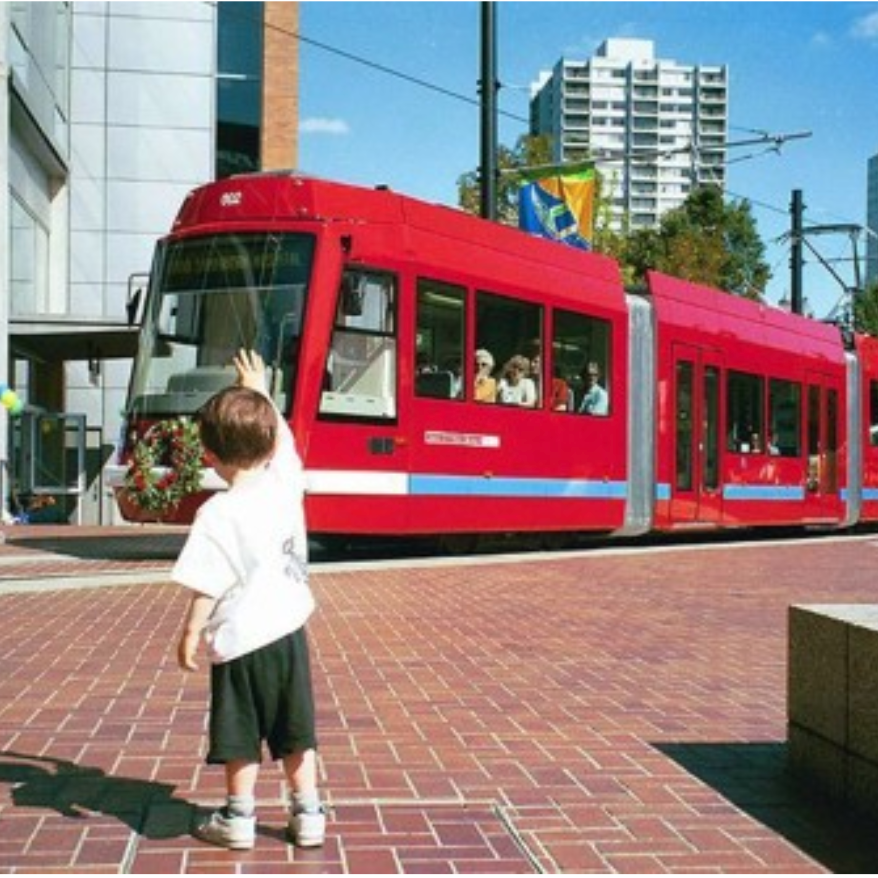The greater Portland area is poised to pass a ballot measure that could radically increase pedestrian infrastructure and transit access for communities of color — but opposition from the region's biggest corporations, and even some urbanists, is threatening the transformational initiative.
The Rose City has a national reputation for progressive politics and a much-memed mania for bikes, but advocates say the broader region has long failed to equitably expand safe and green transportation options to the underserved communities that need them most. Because Oregon bars cities and counties from charging their own sales tax, Portland and its neighbors have had difficulty finding politically tenable ways to pay for light rail expansion, sidewalks, bike lanes, or even to simply modernize asphalt roads. Voters have approved local funding for the metro's light rail network, MAX, just once in the past 30 years — and communities of color and low-income people have largely fallen through the cracks.
"People think Portland is so progressive, but most of the sustainable infrastructure we have is located in a very small area of the Portland downtown where the majority of people do not live," said Vivian Satterfield, a community organizer and director of strategic partnerships at the nonprofit Verde. "It’s really a seven-mile segment that most people don’t interact with all that often — and I work in a neighborhood where 40 percent of the roads are unpaved."

Correcting those disparities is much of the impetus behind the ballot measure, Get Moving 2020, which would levy a payroll tax on employers with more than 25 workers to raise an estimated $5.2 billion for a slate of targeted transportation improvements (see graphic above). The plan is the fruit of two years of public engagement, which Josh Cohen of the Center for Transportation Excellence calls "an unprecedented level of inclusion and accessibility" — especially for a region with a well-documented history of racist exclusion.
"Even before [our Black Lives Matter uprisings put us in the news,] this measure was fundamentally about correcting our patterns of underinvestment in communities of color," said Satterfield. "Especially on the edges of town, where, like in a lot of cities, our lowest-wage earners tend to live due to fundamentally linked patterns of gentrification."
Corporate pushback — and community skepticism
But not every Oregonian is quite so ready to get moving for Get Moving 2020.
Only 9 percent of all Portland-area businesses would be charged the payroll tax — but many of those companies, including deep-pocketed corporations like Nike, Intel, and The Standard, a national insurance company, are funding an opposition campaign, Stop the Metro Wage Tax. Nike has drawn particular scrutiny because of its long history of funding campaigns against raising taxes on large Oregon corporations — and because the reported coordinator of Stop the Metro Wage Tax, Austin Arnold, was a Nike employee as recently as August of this year. (Stop the Metro Wage Tax did not respond to a request for comment.)
"It's pretty remarkable to see a company like this virtue-signaling their support for Black Lives Matter, while at the same time funding a campaign that would oppose transit investments in Black communities," said Cohen, referring to Nike's glossy PR campaigns (like the one below).

But even some urbanists say that Get Moving 2020 may not serve the region as well as proponents claim. Despite being marketed as a historic light rail expansion, only 18 percent of the funds will fund the mode, while the rest will go to road projects. Virtually all of those investments will include at least some new or upgraded facilities for non-drivers — and some of them are significant — but opponents say they won't do enough to unseat the private vehicle from the top of the Portland metro's road hierarchy.
"Yeah, there are 'pedestrian improvements,' but basically, they’re talking about armoring up a few pedestrian areas on roads that are still fundamentally car-centric," said Joe Cortright, a Portland-based economist and author at City Observatory. "Building more crosswalks is absolutely necessary, but doing a pedestrian mega-project doesn’t necessarily turn a street into a pedestrian-friendly area — and if you listen to the proponents [of Get Moving 2020,] they’re not really talking about slowing cars down."
Critics of Get Moving 2020 say that the measure may have originally intended to center the sustainable transportation needs of non-white communities, but the pork barrel simply picked up too many auto projects as it rolled through communities whose support was needed to pass the initiative.
"Metro paved the measure’s way to the ballot by giving every part of the region an earmark for a pet project," wrote G.B. Arrington, former director of long-range planning at TriMet, the region's transit authority. "New suburban highway capacity in Clackamas County, bridge replacement in Multnomah County, quicker access to Port of Portland airport parking garages. ... Pursuing political business as usual is a sure-fire recipe for making Portland more like sprawling auto-oriented Houston than the Portland we have long worked and aspired to be."
Of course, like many U.S. cities, those "sprawling" areas are where many of Portland's non-white residents have been forced to live as Portland has gentrified: an estimated 60 percent of the transit investments outlined in the proposal are located in communities with high populations of color. Proponents of Get Moving argue that those residents simply can't afford to wait until the city finds a way to house more people in a comprehensively connected downtown core, because they're struggling to get around safely in auto-centric places right now.
"[I care] about what these investments could mean for the people who live along that road, or work along that road, or who go to school or the doctor along that road," wrote Marcus Mundy, executive director of Coalitions of Community of Color. "Let’s be clear: this is the kind of careful, intentional investment we need, now, to make this a more equitable region."
Opponents aren't so convinced.
"If you look at who would actually use those suburban roads most, or the roads to the airport, they’re not the poor Black people who live nearby," said Cortright. "The signature light rail project outlined in this measure runs through the richest, whitest part of Portland."
Everyone wants transit, but no one wants to pay for it
But perhaps the most fundamental question of the Get Moving fight isn't where to put new multimodal transportation investments, or what form they should take, but simply who should pay for them — especially in states with limited tools to build the kind of transformational transit projects their regions have long been denied.
"Transit is expensive!" Satterfield said. "Asphalt is expensive, too, of course. But in our region, we’ve delayed necessary transit investments for so long that these numbers are just really big. We need these projects — but we also absolutely need a progressive funding mechanism that eliminates the burden on low-income people."
The architects of the ballot measure say a payroll tax on large corporations is perhaps the only realistic way to get the Portland region that scale of funding without resorting to property taxes, vehicle registration fees, and other regressive mechanisms that community members don't support. But opponents say that the region should have pushed for a better funding structure — especially with the growing threats of climate change.
"If you charge an employer a payroll tax, employers will eventually lower wages to pay for it," said Cortright. "Ideally, we'd have tax systems that at least offered some connection between how much you use the transportation system and how much you pay for it. If I had my druthers, I’d say we implement a congestion charge. And I’d definitely increase the gas tax... This is a critical time for the planet. We can’t spend $5 billion on transportation and not create a meaningful reduction in fossil fuels."
Satterfield doesn't accept that employers will pass the costs of the payroll tax onto their most vulnerable workers, despite Stop the Metro Wage Tax's provocative name. The opposition campaign's suggestion that workers will be paid less is a form of bullying at worst, and manipulation at best, she added.
"As a woman of color myself, it's really something to hear White, corporate executives claim that voting down this measure is a racial justice issue — especially when communities of color have been the ones pushing for the measure since the beginning," she said.
She also notes that these same corporations are likely to grow profits in the long run as Portland's transportation network improves.
"Our transportation system ... will attract more people to the region as it improves," she said. "Nike and big companies like it benefit greatly from the connectedness and creative energy of the Portland region. This measure will only increase both."






